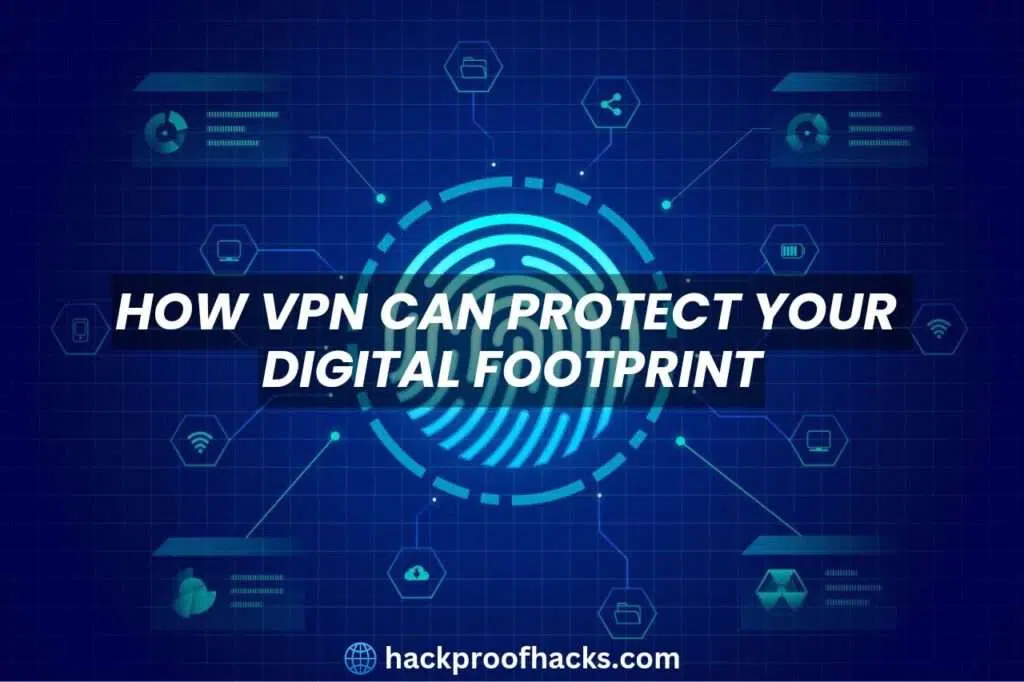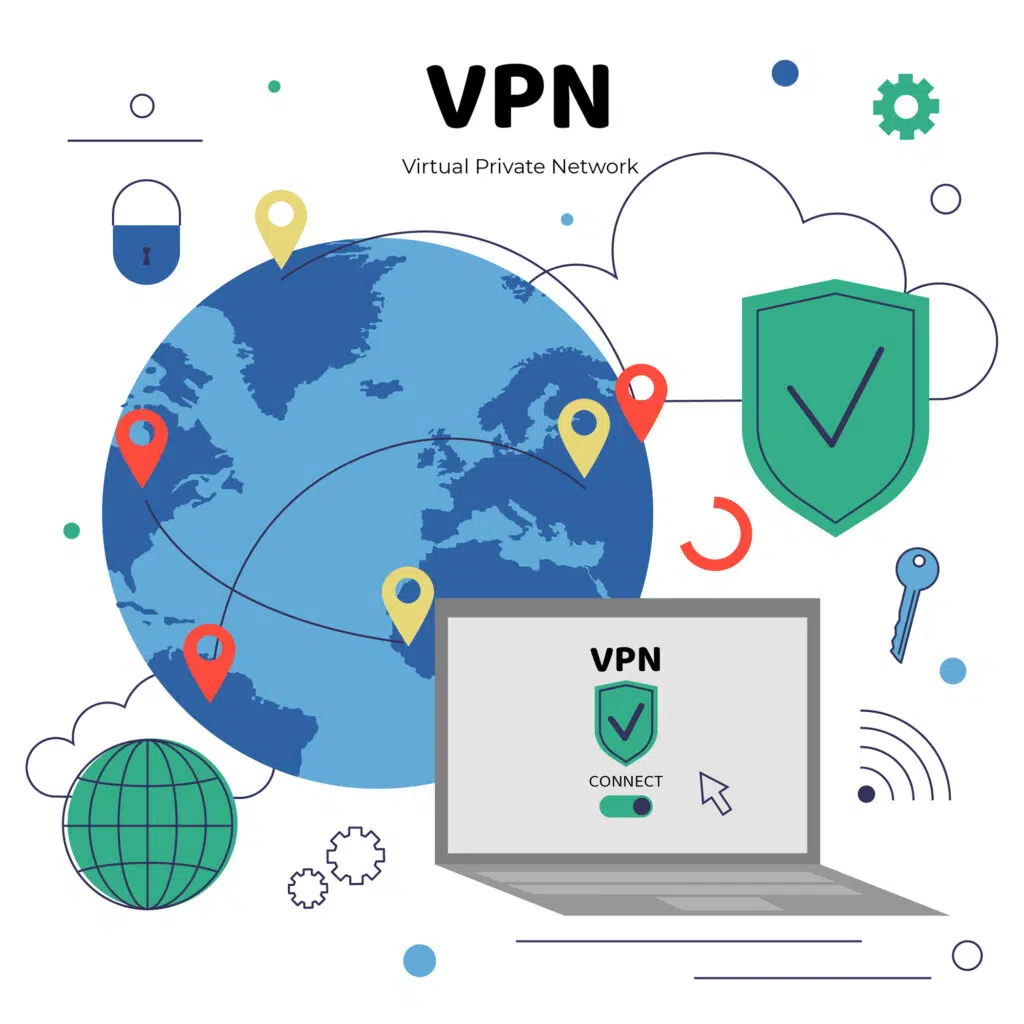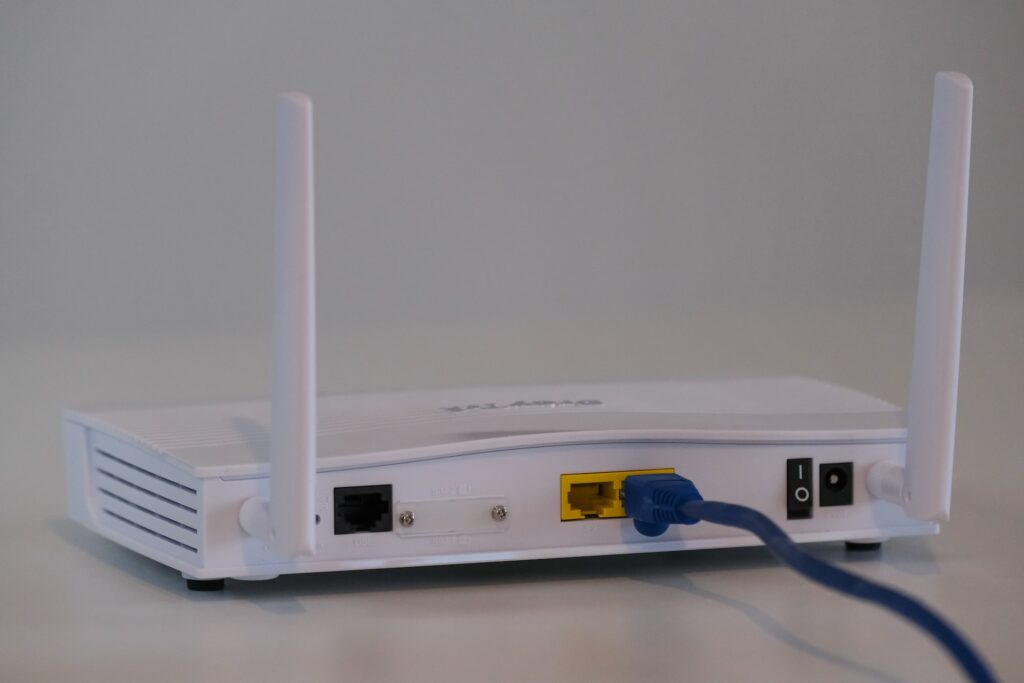Our daily lives are becoming more connected with the internet in this digital age. From social media interactions to online shopping and banking, we leave behind a trail of digital breadcrumbs known as our “digital footprint.” While this trail can be convenient for seamless online experiences, it also poses significant privacy risks.
To further enhance your digital security, it is essential to follow cybersecurity best practices. Check out our article on “7 Cybersecurity Tips to Keep Your Digital Life Safe and Secure” for valuable insights and practical tips on protecting your online presence.
In this post, we’ll go over what a digital footprint is, how it affects your privacy, how you can protect your digital footprint and why VPNs are so important for keeping your online life safe.
Table of Contents

What is Digital Footprint?
Everything you do online be it posting a photo on social media or subscribing to a newsletter on a website contributes to your digital footprint. There could be multiple examples of this:
- Searching for any product online
- Buying or selling stocks
- Using a mobile banking app
- Connecting with friends on social media
- Viewing articles on news app
- Using fitness trackers.
- Registering your email address with a gym
- and a lot more..
As we navigate the internet, our digital footprint accumulates through the websites we visit, the searches we conduct, and the information we share. Companies and even malicious actors collect this data to create detailed profiles of our online behavior.
The Impact of a Digital Footprint on Privacy
Unlike your actual footprint, your Digital footprint will not easily get erased. So, it is important to stay aware and take steps to protect your digital footprint. Even if a website deletes or takes down a piece of your digital footprint, there’s still a chance that someone has stored that information.
Privacy Invasion Scenarios: Our online presence serves various purposes, ranging from targeted advertising and data gathering to more malicious activities like identity theft, phishing, and doxing.
Risks of Exposing Your Digital Footprint: If you expose your digital footprint everywhere, you could lose your privacy, reveal sensitive information, and damage your online reputation.
The Solution to protect your digital footprint
One of the most effective measure to protect your digital footprint is by using a VPN (Virtual Private Network). Let’s learn what is VPN, how it works, what a VPN can do and how you can use one to protect your digital footprint.
What is a VPN?
A Virtual Private Network or VPN allows users to establish a secure and encrypted connection to the internet. It functions as a tunnel, shielding users’ online activities from unauthorized access. VPNs route your internet traffic through remote servers, obscuring your IP address and encrypting your data. This process ensures that your online presence remains private and secure. The Electronic Frontier Foundation (EFF) provides a comprehensive guide on what a VPN is and how it works, which can be found here. Additionally, Privacy International offers valuable insights on the benefits of using a VPN for online privacy, including encryption, anonymity, and bypassing geo-restrictions. You can learn more about these benefits here.
Setup and Working of a VPN
VPN works by creating a secure tunnel from your device to the VPN service provider’s servers which finally connect you to the internet. When you try to access anything over the internet, your data is sent through this tunnel. It encrypts the data and reroutes to the page you want to see.
First of all, you’ll need to install a good VPN and signup with it. Now, how to choose a VPN? You’ll get to know about that in the later section of this Article. After signing up, here’s how a VPN helps:

1. Connect your device to VPN server, which will act as an intermediary between your device and the Internet.
2. As soon as you connect to the VPN server, it will encrypt any data that you upload or download. So, it will create a kind of tunnel between you and the Internet. This is also called “VPN Tunneling”.
3. You can conceptualize the workings of a VPN by imagining a package you are sending via mail. Firstly, you wrap the package with a bubble wrap and send it to the Post Office. At the Post office, the employee checks the address at the top of the packet and sends it to the recipient. Once it is delivered, your recipient unwraps the package and uses it.
What can a VPN do?
In today’s digital age, where online privacy is very important, understanding what a VPN can do is crucial for safeguarding your online presence. It can protect your digital footprint, give you access to geo-restricted content, and a lot more.
1. Enhanced Anonymity: VPN protects an individual from identity theft. It increases the anonymity by masking the IP address. This will make it challenging for anyone to trace your online activities.
2. Encryption of Data: Another key aspect to protect your digital footprint is the encryption of data. VPN encapsulates the data making it almost impossible to recognize the data over the wire. It will protect an individual from eavesdropping and data breaches.
3. Access Geo-Restricted Content: With a VPN, you can use a server outside of your country to access internet content that would normally be restricted to your own country.
4. Protection on Public WiFi: A VPN can protect you from the dangerous public WiFi because it encrypts the data over the wire so nobody can intercept and recognize what data or information you are transferring.
5. Work from home safely: Using a VPN (Virtual Private Network) allows you to connect to your company’s network while working from home, allowing you to access your work documents and stay secure with your company’s security measures.
By using a VPN, you can effectively protect your digital footprint, enhance your online privacy, and ensure that your online activities remain secure and confidential.
Choosing the right VPN
As you guys know, there are a lot of VPN options out there. So, how will you know which VPN you can trust? Here are a few things to consider while choosing a VPN service:
- A lot of VPNs claim that they are free, but they aren’t. They make money by selling the users’ data or by serving them ads. So, it is better to avoid free VPNs.
- Analyse the security experience of the vendor. You should demand transparency and a decent background in cybersecurity because VPN is all about privacy and online security.
- Read the review of the VPN service and compare it with another VPN service provider.
- You should look for the VPN provider’s home country too, because VPN companies must follow the laws of their home country. The government of their country can require them to collect, store, and provide data as per the law.
- Read the VPN’s privacy policy because most VPNs must keep at least connection logs to provide the service. But most of the data you want to keep private So, read it carefully.
Conclusion
In this digital world where people share almost everything with the world, protecting our online is paramount. Protecting your digital footprint is not only about enhancing security, it’s about preserving your personal space in a vast. There are a lot of strategies available to protect your digital footprint like removing your old accounts, avoiding oversharing on social media, removing your information from listing websites, using VPNs, etc. By understanding the importance of your digital footprint and the capabilities of VPNs, you can keep your online presence safe.
Securing your home network is equally important in maintaining a robust digital defense. Learn how to fortify your network with our comprehensive guide, “How to Secure Your Home Network: 6 Easy Steps.”
When it comes to safeguarding your digital assets, understanding the importance of crypto wallets is crucial. Dive into our article, “Crypto Wallets: Safeguarding Your Digital Assets in the USA,” to explore the best practices for protecting your cryptocurrency investments.
In addition to software and practices, having the right cybersecurity gadgets can provide an extra layer of protection. Discover the top 10 must-have cybersecurity gadgets for home defense in our article, “Top 10 Must-Have Cybersecurity Gadgets for Home Defense.”
FAQs
What is Digital Footprint?
From social media interactions to online shopping and banking, we leave behind a trail of digital breadcrumbs known as our “digital footprint.”
How can i protect my digital footprint?
There are a few things that you can do to protect your digital footprints:
1. Remove yourself from any listing websites like whitpages.com
2. Think before posting on social media
3. Avoid HTTP websites.
4. Delete old social media accounts
5. Use VPN
Can digital footprint be deleted?
Deleting your digital footprint is almost impossible because any activity made online has traces of information linked to you stored from third-party services. Even if a website deletes or takes down a piece of your digital footprint, there’s still a chance that someone has stored that information.
Can i trust free VPN?
A lot of free VPNs make money by selling your browsing info to other people, which is weird since you’re supposed to be using a VPN for privacy.
Can my VPN provider see my browsing history?
Any VPN provider can log your browsing history. However, reputable VPNs will not store monitor or store browsing history. It also depends upon the country. For example, India has recently passed a law that demands all VPN providers to log and store user data for at least five years.





Pingback: 20 Ways Scammers Can Steal Your Credit Card Numbers in 2024 - HackProofHacks